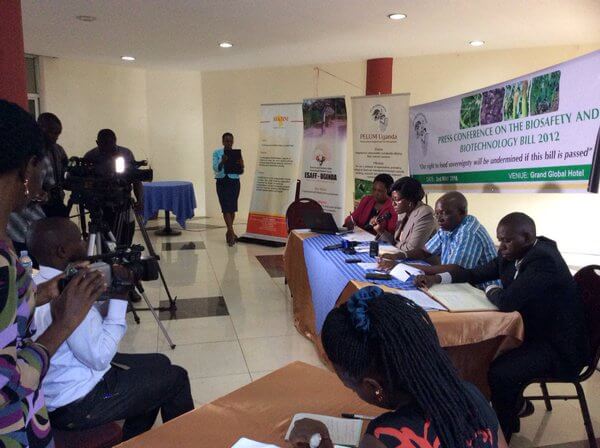A cross section of Ugandan farmers and national legislators are aggressively lobbying the outgoing Parliament to quickly pass the Biosafety and Biotechnology Bill 2012 before their term ends this month. There is general agreement that a Biosafety law needs to be enacted to provide a regulatory framework for several biotech research projects currently taking place in confinement in the country.
There are several traits Ugandan scientists have utilized over the years through genetic engineering that could help improve local varieties of major staples like banana, cassava, sweet potato and maize:
- resistance to cotton boll worm
- herbicides tolerance
- resistance to cassava brown streak virus
- resistance to banana bacterial wilt
- resistance to black sigatoka disease in bananas
- Provitamin A enhancer
- resistance to sweet potato virus
- resistance to Potato blight disease
- tolerance to to low soil nitrogen and tolerance to drought

Youths leaders, students, and farmers came calling for the Biosafety law
Students from Makerere University threatened to drop the biotechnology courses they are pursuing claiming it would be a waste of time if the government does not plan on using their expertise. Many Ugandan farmers agree with scientists that biotechnology is key in addressing many of their persistent farming needs like drought, pests and disease. They say the failure by the legislators to pass the bill has denied them chances to access modern technologies being developed by the National Agricultural Research Organisation (NARO) centers spread across the country. They pledged their support for science, attesting that it has been scientists who have always provided them with solutions. The youth leaders representing the ruling party and other parties came in solidarity.
“Cassava production in the region has gone down because of cassava diseases. This has affected farmers economically because revenue from the crop has gone down,” said Dominic Ettellu, a farmer from Teso region in eastern Uganda and Chairperson of Uganda National Biotechnology Farmers’ Forum to East African Business Week. “The only way to help farmers is to allow them adopt the technologies which our local scientists have developed to support farmer to mitigate the challenges of cassava mosaic. But that cannot be done when parliament has not okayed the application of biotechnology in the country,”
Anti GMO Activists awakened call the press
The anti-GMO groups led by Participatory Ecological Land Use Management (Pelum), Uganda, The Eastern and Southern Africa small scale Farmers’ Forum (ESAFF), Uganda, and The South and Eastern African Trade Information and Negotiations Institute (SEATING), Uganda, convened a press conference in an attempt to deflect the students’ and farmers’ message. The NGOs are used presenting their position before reporters with almost no background on these issues. This time they faced a professional media who were well versed in the controversy, and were clearly skeptical of the NGO belief that they are “saviors of our indigenous foods”.
The activists usually push familiar themes, such as citing Google features on the retracted Seralini GMO and glyphosate study, and showing pictures found online of rats with grotesque tumors. They often also claim genetically engineered seeds do not germinate, that GMOs are causing a loss of indigenous plants and other misrepresentations. In this instance, the activists in their usual style went accused the minister who is in charge of the legislation for having “connived with Monsanto to pass the Biosafety bill.” Their criticisms were endorsed by a host of protest groups including, Action Aid Uganda (AAIU), Caritas Uganda, Join Energy and Environment Projects (JEEP), Community Integrated Development Initiatives (CIDI), Agency for Integrated Rural Development (AFIRD), Caritas Kampala,and Food Rights Alliance (FRA).
The Biosafety and Biotechnology Bill 2012 has been on the floor of Parliament for about three years. The Uganda Biosafety and Biotechnology consortium told East African Business Week if the Bill is not passed, the Ugandan market will be flooded with GMO products from Tanzania and Kenya.
Isaac Ongu is an agriculturist, science writer and an advocate for science based interventions in solving agricultural challenges in developing countries. Follow Isaac on twitter @onguisaac.































